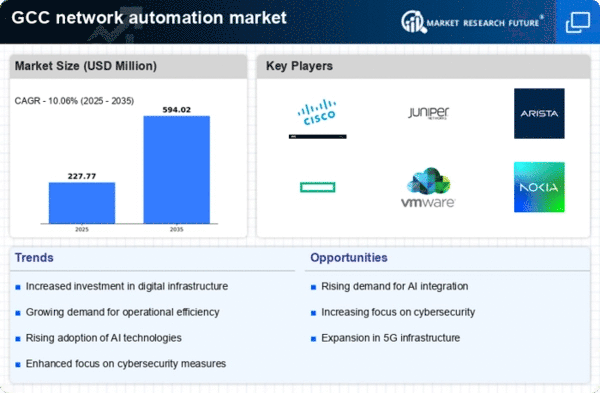Expansion of 5G Technology
The rollout of 5G technology is poised to have a transformative impact on the network automation market in the GCC. With its promise of ultra-fast connectivity and low latency, 5G is enabling new applications and services that require advanced network management capabilities. The demand for automated solutions is likely to increase as businesses look to optimize their networks for 5G deployment. Market Research Future suggest that the network automation market could see a growth rate of 25% as organizations invest in automation tools to manage the complexities associated with 5G networks. This expansion presents a unique opportunity for service providers to enhance their offerings and improve customer satisfaction through automated network management.
Growing Cybersecurity Concerns
The network automation market is significantly influenced by the rising concerns surrounding cybersecurity in the GCC. As organizations increasingly rely on digital networks, the threat landscape has expanded, prompting a greater emphasis on securing network infrastructures. Recent studies indicate that cyberattacks have increased by over 40% in the region, leading businesses to prioritize security measures. Network automation solutions are being adopted to enhance security protocols, automate threat detection, and ensure compliance with regulatory standards. This heightened focus on cybersecurity is expected to drive growth in the network automation market, as organizations seek to implement robust security frameworks that can adapt to evolving threats.
Shift Towards Hybrid IT Environments
The transition to hybrid IT environments is significantly shaping the network automation market in the GCC. Organizations are increasingly adopting a mix of on-premises and cloud-based solutions to meet their diverse operational needs. This shift necessitates the implementation of automation tools to ensure seamless integration and management of hybrid infrastructures. Recent surveys indicate that over 70% of GCC businesses are exploring hybrid IT strategies, highlighting the demand for automation solutions that can facilitate this transition. As companies seek to optimize their IT resources and improve flexibility, the network automation market is expected to grow, driven by the need for efficient management of complex hybrid environments.
Rising Demand for Operational Efficiency
The network automation market is experiencing a notable surge in demand for operational efficiency across various sectors in the GCC. Organizations are increasingly recognizing the need to streamline their network operations to reduce costs and enhance productivity. According to recent data, companies that have implemented network automation solutions report a reduction in operational costs by up to 30%. This trend is driven by the necessity to manage complex network environments effectively, as businesses seek to minimize downtime and improve service delivery. The integration of automation tools allows for real-time monitoring and management, which is crucial in today's fast-paced digital landscape. As a result, the network automation market is poised for significant growth, with projections indicating a compound annual growth rate (CAGR) of over 20% in the coming years.
Increased Focus on Digital Transformation
Digital transformation initiatives are reshaping the landscape of the network automation market in the GCC. Organizations are increasingly investing in automation technologies to support their digital strategies, aiming to enhance customer experiences and operational agility. The shift towards digitalization is evident, with a reported 60% of businesses in the region prioritizing automation as a key component of their transformation efforts. This focus on digital transformation is not only about adopting new technologies but also about rethinking business processes to leverage automation effectively. As companies strive to remain competitive, the network automation market is likely to see a surge in demand for innovative solutions that facilitate seamless integration and scalability.
















